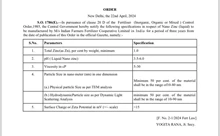
In a bid to integrate traditional Ayurveda practices with scientific validation, the Central Council for Research in Ayurveda Sciences (CCRAS), under the Ministry of Ayush, has unveiled the Ayurveda Gyan Naipunya Initiative (AGNI). The initiative is designed to encourage qualified Ayurveda practitioners to contribute their innovative experiences and practices in various disease conditions.
Ayurvedic physicians interested in participating in AGNI can submit their Expression of Interest by December 15, 2023, using the format available on the CCRAS website (http://ccras.nic.in/sites/default/files/Notices/CCRAS-AGNI.pdf). Submissions can be sent to ccrasagni@gmail.com.
Prof Rabinarayanan Acharya, Director General of CCRAS, outlined the project's objectives, which include providing a platform for Ayurveda practitioners to share their innovative practices, fostering evidence-based practices within the Ayurveda community, and conducting research to validate and mainstream pragmatic Ayurvedic practices.
Under the AGNI initiative, CCRAS will document and publish reported medical practices and therapeutic regimens for educational and academic purposes in consultation with the National Council for Indian System of Medicine (NCISM).
Additionally, CCRAS may collaborate with Ayurveda practitioners and other relevant institutes/organizations to develop research proposals for further studies on reported medical practices. With over 500,000 registered Ayurveda practitioners predominantly based in India, CCRAS plays a pivotal role as an apex research organization committed to promoting research on scientific lines in Ayurveda.
In recent efforts to enhance scientific research in Ayurveda, CCRAS has introduced various programs, including the Studentship Program for Ayurveda Research Ken (SPARK) for undergraduate scholars, the Scheme for Training in Ayurveda Research for PG Scholars (PG-STAR) for postgraduate scholars, and the Scope for Mainstreaming Ayurveda Research in Teaching Professionals (SMART) program for teachers.
Ayurveda, in recent times, has proven successful in managing both acute and chronic diseases not explicitly described in classical Ayurvedic texts. The discipline's global recognition has notably increased due to its efficacy in addressing reported adverse effects of synthetic drugs and procedures.











